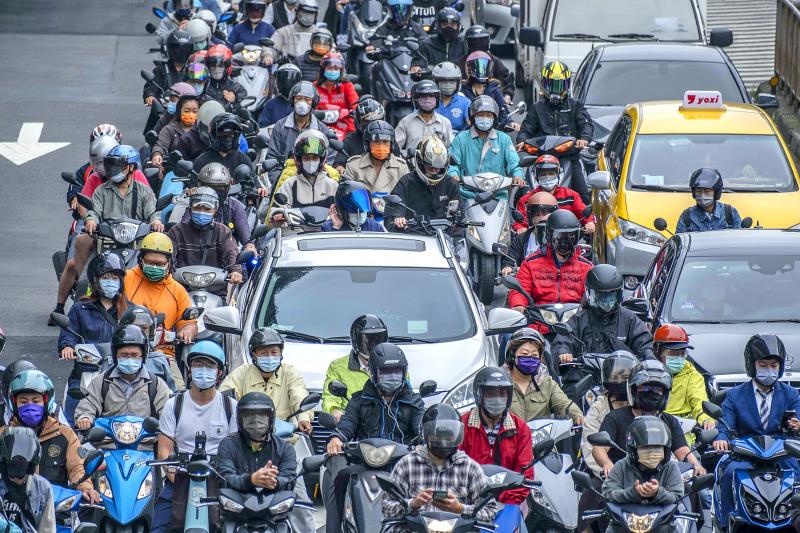Taiwan and the US are planning to announce negotiations to deepen economic ties, people familiar with the matter said, as Beijing cautioned Washington against getting too close to Taipei.
The talks would focus on enhancing economic cooperation and supply-chain resiliency, falling short of a traditional free-trade agreement, the people said.
The deal is likely to include areas of trade facilitation, supply-chain work and trade in agricultural products, they said, speaking on condition of anonymity ahead of a public announcement.

Photo: Bloomberg
Those elements are similar to the pillars in the 13-member Indo-Pacific Economic Framework (IPEF) that US President Joe Biden announced on Monday during his visit to Tokyo.
While a bipartisan group of lawmakers wanted Taiwan in that group, it was excluded because some nations that agreed to join refused to have Taipei included over fear of retribution from Beijing, people familiar with the process said.
The talks are an effort to elevate the US-Taiwan economic relationship, the people said, and would go beyond existing discussions under a Trade and Investment Framework Agreement between the two governments.
A US Trade Representative spokesman declined to comment on the plans for talks on deepening bilateral economic engagement.
A spokesperson for the Taipei Economic and Cultural Representative Office in the US did not respond to a request for comment.
US Trade Representative Katherine Tai (戴琪) told Bloomberg TV this week that she and her Taiwanese counterpart, Minister Without Portfolio John Deng (鄧振中), had “very positive conversations” when they met in Bangkok last Saturday.
“We are committed to deepening and enhancing the bilateral trade and economic relationship, and we instructed our teams to work over the course of the next couple of weeks on that deepening and enhancement,” Tai said.
The two agreed to meet again in the coming weeks to discuss the path forward, the US Trade Representative said in a readout.
A large Taiwanese government and business delegation is expected to attend the SelectUSA Investment Summit outside Washington next month, giving both sides another chance to meet face-to-face.
US officials have said that the reliance on Taiwan for semiconductors in particular is a geopolitical strategic problem and have pushed for a subsidy program that incentivizes domestic manufacturing of chips. That initiative is part of broader legislation that could pass later this year.
Taiwan for years has been pushing the US to negotiate a trade agreement, but US officials have said that roadblocks in Taiwan’s economic practices, including on agriculture, would need to be resolved as a prerequisite for any negotiations to take place.
The administration of former US president Donald Trump, in particular, was hesitant to engage with Taiwan economically while it was negotiating its phase one trade deal with Beijing, people familiar with the deliberations said at the time.

AIR SUPPORT: The Ministry of National Defense thanked the US for the delivery, adding that it was an indicator of the White House’s commitment to the Taiwan Relations Act Deputy Minister of National Defense Po Horng-huei (柏鴻輝) and Representative to the US Alexander Yui on Friday attended a delivery ceremony for the first of Taiwan’s long-awaited 66 F-16C/D Block 70 jets at a Lockheed Martin Corp factory in Greenville, South Carolina. “We are so proud to be the global home of the F-16 and to support Taiwan’s air defense capabilities,” US Representative William Timmons wrote on X, alongside a photograph of Taiwanese and US officials at the event. The F-16C/D Block 70 jets Taiwan ordered have the same capabilities as aircraft that had been upgraded to F-16Vs. The batch of Lockheed Martin

US President Donald Trump yesterday announced sweeping "reciprocal tariffs" on US trading partners, including a 32 percent tax on goods from Taiwan that is set to take effect on Wednesday. At a Rose Garden event, Trump declared a 10 percent baseline tax on imports from all countries, with the White House saying it would take effect on Saturday. Countries with larger trade surpluses with the US would face higher duties beginning on Wednesday, including Taiwan (32 percent), China (34 percent), Japan (24 percent), South Korea (25 percent), Vietnam (46 percent) and Thailand (36 percent). Canada and Mexico, the two largest US trading

GRIDLOCK: The National Fire Agency’s Special Search and Rescue team is on standby to travel to the countries to help out with the rescue effort A powerful earthquake rocked Myanmar and neighboring Thailand yesterday, killing at least three people in Bangkok and burying dozens when a high-rise building under construction collapsed. Footage shared on social media from Myanmar’s second-largest city showed widespread destruction, raising fears that many were trapped under the rubble or killed. The magnitude 7.7 earthquake, with an epicenter near Mandalay in Myanmar, struck at midday and was followed by a strong magnitude 6.4 aftershock. The extent of death, injury and destruction — especially in Myanmar, which is embroiled in a civil war and where information is tightly controlled at the best of times —

China's military today said it began joint army, navy and rocket force exercises around Taiwan to "serve as a stern warning and powerful deterrent against Taiwanese independence," calling President William Lai (賴清德) a "parasite." The exercises come after Lai called Beijing a "foreign hostile force" last month. More than 10 Chinese military ships approached close to Taiwan's 24 nautical mile (44.4km) contiguous zone this morning and Taiwan sent its own warships to respond, two senior Taiwanese officials said. Taiwan has not yet detected any live fire by the Chinese military so far, one of the officials said. The drills took place after US Secretary